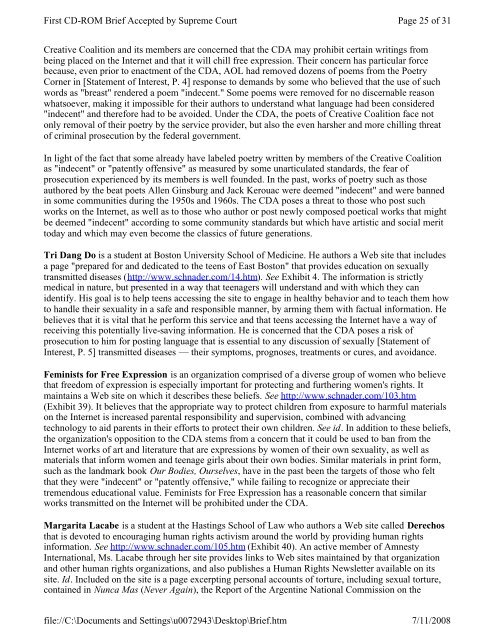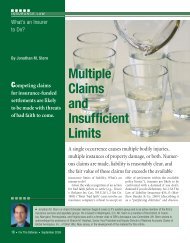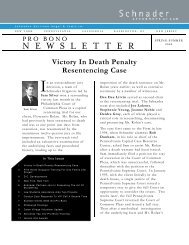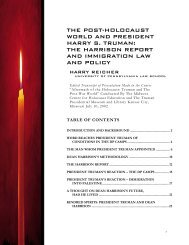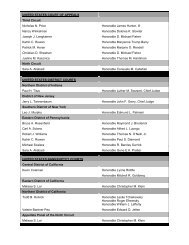Filed the first CD-ROM brief in the U.S. Supreme Court - Schnader ...
Filed the first CD-ROM brief in the U.S. Supreme Court - Schnader ...
Filed the first CD-ROM brief in the U.S. Supreme Court - Schnader ...
You also want an ePaper? Increase the reach of your titles
YUMPU automatically turns print PDFs into web optimized ePapers that Google loves.
First <strong>CD</strong>-<strong>ROM</strong> Brief Accepted by <strong>Supreme</strong> <strong>Court</strong><br />
Page 25 of 31<br />
Creative Coalition and its members are concerned that <strong>the</strong> <strong>CD</strong>A may prohibit certa<strong>in</strong> writ<strong>in</strong>gs from<br />
be<strong>in</strong>g placed on <strong>the</strong> Internet and that it will chill free expression. Their concern has particular force<br />
because, even prior to enactment of <strong>the</strong> <strong>CD</strong>A, AOL had removed dozens of poems from <strong>the</strong> Poetry<br />
Corner <strong>in</strong> [Statement of Interest, P. 4] response to demands by some who believed that <strong>the</strong> use of such<br />
words as "breast" rendered a poem "<strong>in</strong>decent." Some poems were removed for no discernable reason<br />
whatsoever, mak<strong>in</strong>g it impossible for <strong>the</strong>ir authors to understand what language had been considered<br />
"<strong>in</strong>decent" and <strong>the</strong>refore had to be avoided. Under <strong>the</strong> <strong>CD</strong>A, <strong>the</strong> poets of Creative Coalition face not<br />
only removal of <strong>the</strong>ir poetry by <strong>the</strong> service provider, but also <strong>the</strong> even harsher and more chill<strong>in</strong>g threat<br />
of crim<strong>in</strong>al prosecution by <strong>the</strong> federal government.<br />
In light of <strong>the</strong> fact that some already have labeled poetry written by members of <strong>the</strong> Creative Coalition<br />
as "<strong>in</strong>decent" or "patently offensive" as measured by some unarticulated standards, <strong>the</strong> fear of<br />
prosecution experienced by its members is well founded. In <strong>the</strong> past, works of poetry such as those<br />
authored by <strong>the</strong> beat poets Allen G<strong>in</strong>sburg and Jack Kerouac were deemed "<strong>in</strong>decent" and were banned<br />
<strong>in</strong> some communities dur<strong>in</strong>g <strong>the</strong> 1950s and 1960s. The <strong>CD</strong>A poses a threat to those who post such<br />
works on <strong>the</strong> Internet, as well as to those who author or post newly composed poetical works that might<br />
be deemed "<strong>in</strong>decent" accord<strong>in</strong>g to some community standards but which have artistic and social merit<br />
today and which may even become <strong>the</strong> classics of future generations.<br />
Tri Dang Do is a student at Boston University School of Medic<strong>in</strong>e. He authors a Web site that <strong>in</strong>cludes<br />
a page "prepared for and dedicated to <strong>the</strong> teens of East Boston" that provides education on sexually<br />
transmitted diseases (http://www.schnader.com/14.htm). See Exhibit 4. The <strong>in</strong>formation is strictly<br />
medical <strong>in</strong> nature, but presented <strong>in</strong> a way that teenagers will understand and with which <strong>the</strong>y can<br />
identify. His goal is to help teens access<strong>in</strong>g <strong>the</strong> site to engage <strong>in</strong> healthy behavior and to teach <strong>the</strong>m how<br />
to handle <strong>the</strong>ir sexuality <strong>in</strong> a safe and responsible manner, by arm<strong>in</strong>g <strong>the</strong>m with factual <strong>in</strong>formation. He<br />
believes that it is vital that he perform this service and that teens access<strong>in</strong>g <strong>the</strong> Internet have a way of<br />
receiv<strong>in</strong>g this potentially live-sav<strong>in</strong>g <strong>in</strong>formation. He is concerned that <strong>the</strong> <strong>CD</strong>A poses a risk of<br />
prosecution to him for post<strong>in</strong>g language that is essential to any discussion of sexually [Statement of<br />
Interest, P. 5] transmitted diseases — <strong>the</strong>ir symptoms, prognoses, treatments or cures, and avoidance.<br />
Fem<strong>in</strong>ists for Free Expression is an organization comprised of a diverse group of women who believe<br />
that freedom of expression is especially important for protect<strong>in</strong>g and fur<strong>the</strong>r<strong>in</strong>g women's rights. It<br />
ma<strong>in</strong>ta<strong>in</strong>s a Web site on which it describes <strong>the</strong>se beliefs. See http://www.schnader.com/103.htm<br />
(Exhibit 39). It believes that <strong>the</strong> appropriate way to protect children from exposure to harmful materials<br />
on <strong>the</strong> Internet is <strong>in</strong>creased parental responsibility and supervision, comb<strong>in</strong>ed with advanc<strong>in</strong>g<br />
technology to aid parents <strong>in</strong> <strong>the</strong>ir efforts to protect <strong>the</strong>ir own children. See id. In addition to <strong>the</strong>se beliefs,<br />
<strong>the</strong> organization's opposition to <strong>the</strong> <strong>CD</strong>A stems from a concern that it could be used to ban from <strong>the</strong><br />
Internet works of art and literature that are expressions by women of <strong>the</strong>ir own sexuality, as well as<br />
materials that <strong>in</strong>form women and teenage girls about <strong>the</strong>ir own bodies. Similar materials <strong>in</strong> pr<strong>in</strong>t form,<br />
such as <strong>the</strong> landmark book Our Bodies, Ourselves, have <strong>in</strong> <strong>the</strong> past been <strong>the</strong> targets of those who felt<br />
that <strong>the</strong>y were "<strong>in</strong>decent" or "patently offensive," while fail<strong>in</strong>g to recognize or appreciate <strong>the</strong>ir<br />
tremendous educational value. Fem<strong>in</strong>ists for Free Expression has a reasonable concern that similar<br />
works transmitted on <strong>the</strong> Internet will be prohibited under <strong>the</strong> <strong>CD</strong>A.<br />
Margarita Lacabe is a student at <strong>the</strong> Hast<strong>in</strong>gs School of Law who authors a Web site called Derechos<br />
that is devoted to encourag<strong>in</strong>g human rights activism around <strong>the</strong> world by provid<strong>in</strong>g human rights<br />
<strong>in</strong>formation. See http://www.schnader.com/105.htm (Exhibit 40). An active member of Amnesty<br />
International, Ms. Lacabe through her site provides l<strong>in</strong>ks to Web sites ma<strong>in</strong>ta<strong>in</strong>ed by that organization<br />
and o<strong>the</strong>r human rights organizations, and also publishes a Human Rights Newsletter available on its<br />
site. Id. Included on <strong>the</strong> site is a page excerpt<strong>in</strong>g personal accounts of torture, <strong>in</strong>clud<strong>in</strong>g sexual torture,<br />
conta<strong>in</strong>ed <strong>in</strong> Nunca Mas (Never Aga<strong>in</strong>), <strong>the</strong> Report of <strong>the</strong> Argent<strong>in</strong>e National Commission on <strong>the</strong><br />
file://C:\Documents and Sett<strong>in</strong>gs\u0072943\Desktop\Brief.htm<br />
7/11/2008


